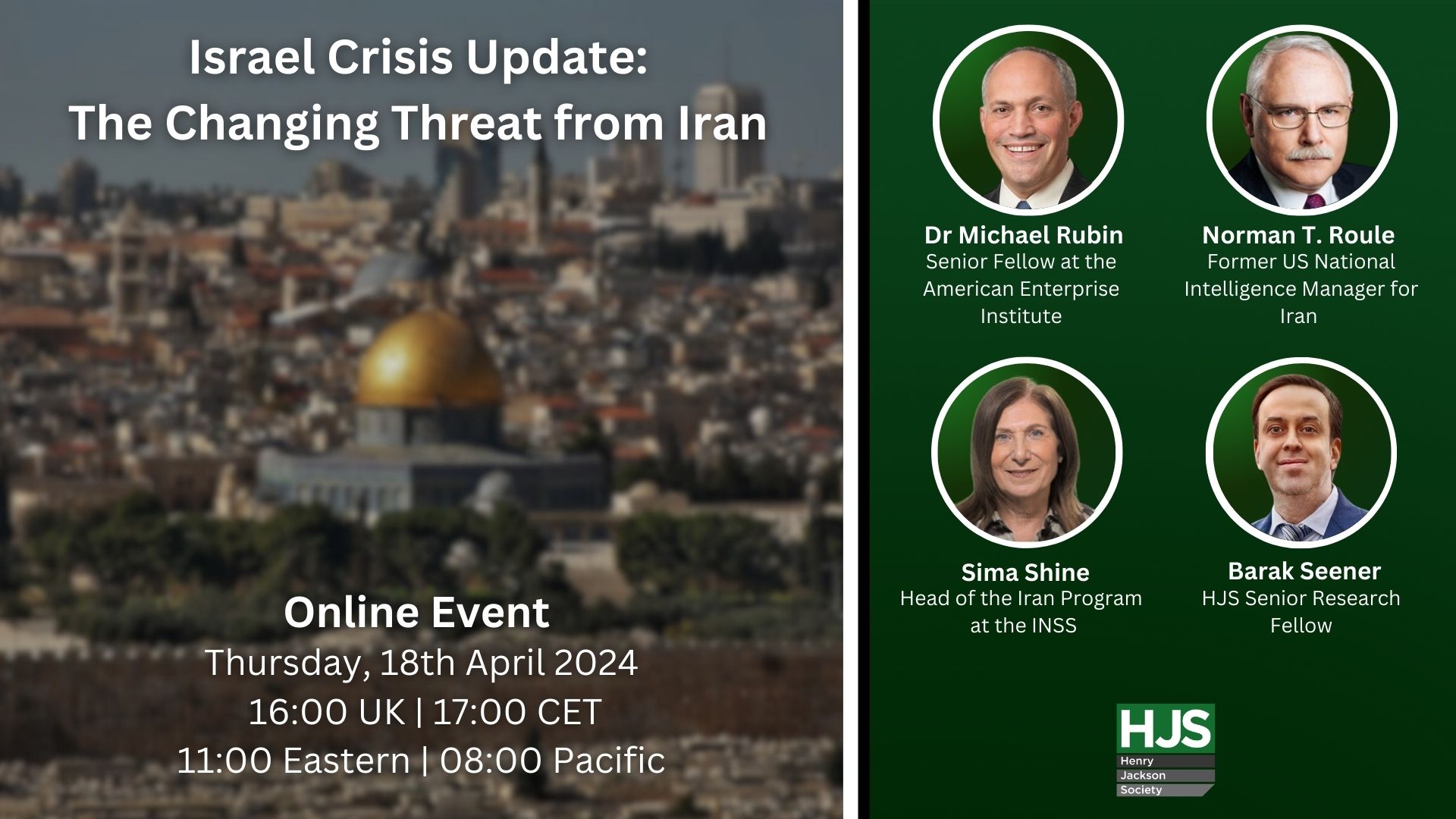Israel Crisis Update: The Changing Threat from Iran

- This event has passed.
Israel Crisis Update: The Changing Threat from Iran
18 April @ 4:00 pm - 5:00 pm

Iran’s recent attack against Israel saw it launching cruise and ballistic missiles as well as drones from its own soil, rather than relying on proxy forces. How should we understand the changing nature of the Iranian threat, and what action should Israel, the US and their allies now take?
Ever since the Abraham Accords of 2020, a new security order has been emerging in the Middle East – one that leaves Iran increasingly alienated, as Israel works with Sunni Arab states to counter Iranian terror. The latest sign of this is the prospect of Saudi Arabia’s normalisation of ties with Israel.
Iran is becoming increasingly disruptive in the region, even as it inches towards nuclear status. The horror of October 7, perpetrated by Iran’s proxy Hamas, and this latest direct attack both show the risk this poses. At the same time, Iran’s global strategy now involves undermining the liberal international order as part of the ‘axis of resistance’, for example by providing Russia with weapons to target Ukraine.
As Iran’s strategy towards its region and international theatres evolves, it must be met by the US, Israel and GCC states changing their respective strategies towards Iran and its proxies to restore deterrence and prevent Iran from going nuclear.
The Henry Jackson Society is pleased to welcome you to this discussion with the renowned experts in the field.

This photo is property of https://www.aei.org/profile/michael-rubin/
Dr Michael Rubin is a senior fellow at the American Enterprise Institute, where he specializes in Iran, Turkey, and the broader Middle East.
A former Pentagon official, Dr. Rubin has lived in post-revolution Iran, Yemen, and both pre- and postwar Iraq. He also spent time with the Taliban before 9/11. For more than a decade, he taught classes at sea about the Horn of Africa and Middle East conflicts, culture, and terrorism, to deployed US Navy and Marine units.
Dr. Rubin is the author, coauthor, and co-editor of several books exploring diplomacy, Iranian history, Arab culture, Kurdish studies, and Shi’ite politics, including “Seven Pillars: What Really Causes Instability in the Middle East?” (AEI Press, 2019); “Kurdistan Rising” (AEI Press, 2016); “Dancing with the Devil: The Perils of Engaging Rogue Regimes” (Encounter Books, 2014); and “Eternal Iran: Continuity and Chaos” (Palgrave, 2005).
Dr. Rubin has a PhD and an MA in history from Yale University, where he also obtained a BS in biology.

This photo is a property of https://www.csis.org/people/norman-t-roule
Norman T. Roule served for 34 years in the Central Intelligence Agency, managing significant programs relating to the Middle East. Mr. Roule’s service in the CIA’s Directorate of Operations included roles as division chief, deputy division chief, and chief of station. He has held multiple senior assignments in Washington as well as during more than 15 years of overseas work. He served as the national intelligence manager for Iran (NIM-I) at the Office of the Director of National Intelligence from November 2008 until September 2017. As NIM-I, he was the principal intelligence community (IC) official responsible for overseeing national intelligence policy and activities related to Iran and Iran-related issues, to include IC engagement on these topics with senior policymakers in the National Security Council, the Department of State, and Congress. Mr. Roule received multiple awards during his career. Mr. Roule currently works as a business consultant on Middle East political, security, economic, and energy issues with an emphasis on the Gulf Cooperation Council states and Iran. He also serves as senior adviser to the Counter Extremism Project, United Against Nuclear Iran, the Nuclear Threat Initiative and as a member of the advisory board of the Arabia Foundation. Mr. Roule is currently also a senior advisor at the Belfer Center for Science and International Affairs at the Harvard Kennedy School and a non-resident senior adviser with the Transnational Threats Project at the Center for Strategic and International Studies (CSIS).

This photo is a property of https://www.inss.org.il/person/shinesima/
Sima Shine is currently the head of Iran program at the Institute for National Security Studies (INSS). Sima was Head of the Research & Evaluation Division of the Mossad (2003-2007). In this capacity, she was in charge of the production of both daily and periodical evaluations on Middle Eastern and international issues, led security and intelligence dialogues with various counterparts in the international community, and was involved in political-military meetings with decision makers.
After her retirement from the Mossad, Shine served as Deputy Head of Strategic Affairs in Israel’s National Security Council (2008-2009) and then (2009 -2016) served in the Ministry of Strategic Affairs, where she was responsible, inter alia, for the Iranian file and was deputy Director General.

Barak Seener is a Senior Research Fellow at the Henry Jackson Society and the founder of Strategic Intelligentia and the Gulf Futures Forum. Previously, Barak was a Global Intelligence Manager at HSBC and the Middle East Fellow at the Royal United Services Institute (RUSI) on whose behalf he has debriefed international defence and security policy makers and diplomats on matters relating to Middle East security. Barak has lectured at NATO as well as the Royal College for Defence Studies. He also staged the world’s first, and hugely successful conference in London at the Royal United Services Institute (RUSI) on Palestinian statehood. This examined the security Implications for the Region bringing together leading Israelis, Palestinians, US and European representatives in London 2011. Prior to joining RUSI, Barak was one of the Henry Jackson Society’s founders in Westminster and was the Henry Jackson Society’s Greater Middle East Section Director.
Barak published a book in 2018 entitled, ‘Commercial Risks Entering the Iranian Market: Why sanctions make investment in the Islamic Republic of Iran a high-risk proposition.’
Barak has published and provided analysis and expert commentary for a range of international broadcasters including Al-Jazeera, BBC, CNN, Chinese CCTV, Fox News, Sky News, Voice of America, and news outlets such as Bloomberg, Reuters, Associated Press, the Evening Standard, Jerusalem Post and Xinhua.
Barak has published in publications including Newsweek, the National Interest, the American Interest, Jane’s Intelligence Review and Jane’s Islamic Affairs Analyst on counter-terrorism, US-China dynamics, risks to supply chains, globalization and the end of the liberal international order, transatlantic relations, universal jurisdiction, nuclear proliferation and Middle East issues including the Arab Spring, tensions in Libya, Egypt and Syria, strategic and security dynamic between Iran and the Gulf, and the Palestinian-Israeli conflict.
This event can only be watched ONLINE. Click HERE to register.
RELATED EVENTS
British General Election Campaigns 1830-2019: Can The Past Inform The Future?”
The British general election is the linchpin of our liberal democracy, and its results are often fundamental to how we live. With the next UK general election looming, there is therefore … Continued
How Mongolia is Transforming into a Beacon for Foreign Direct Investment in East Asia
Lord David Cameron’s April 2024 visit to Mongolia and Central Asia demonstrates the growing importance that London places on protecting and promoting British interests in the Indo-Pacific region. A new report … Continued




